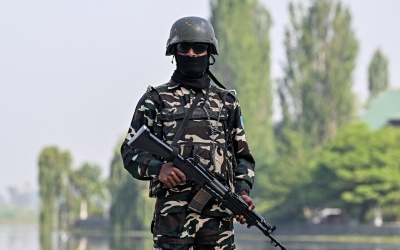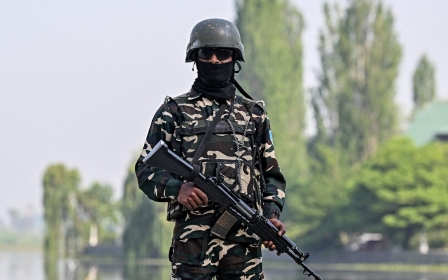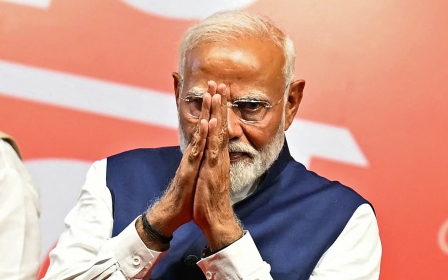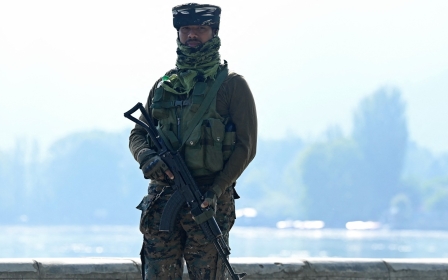The 'terror' case against Arundhati Roy and what it says about India
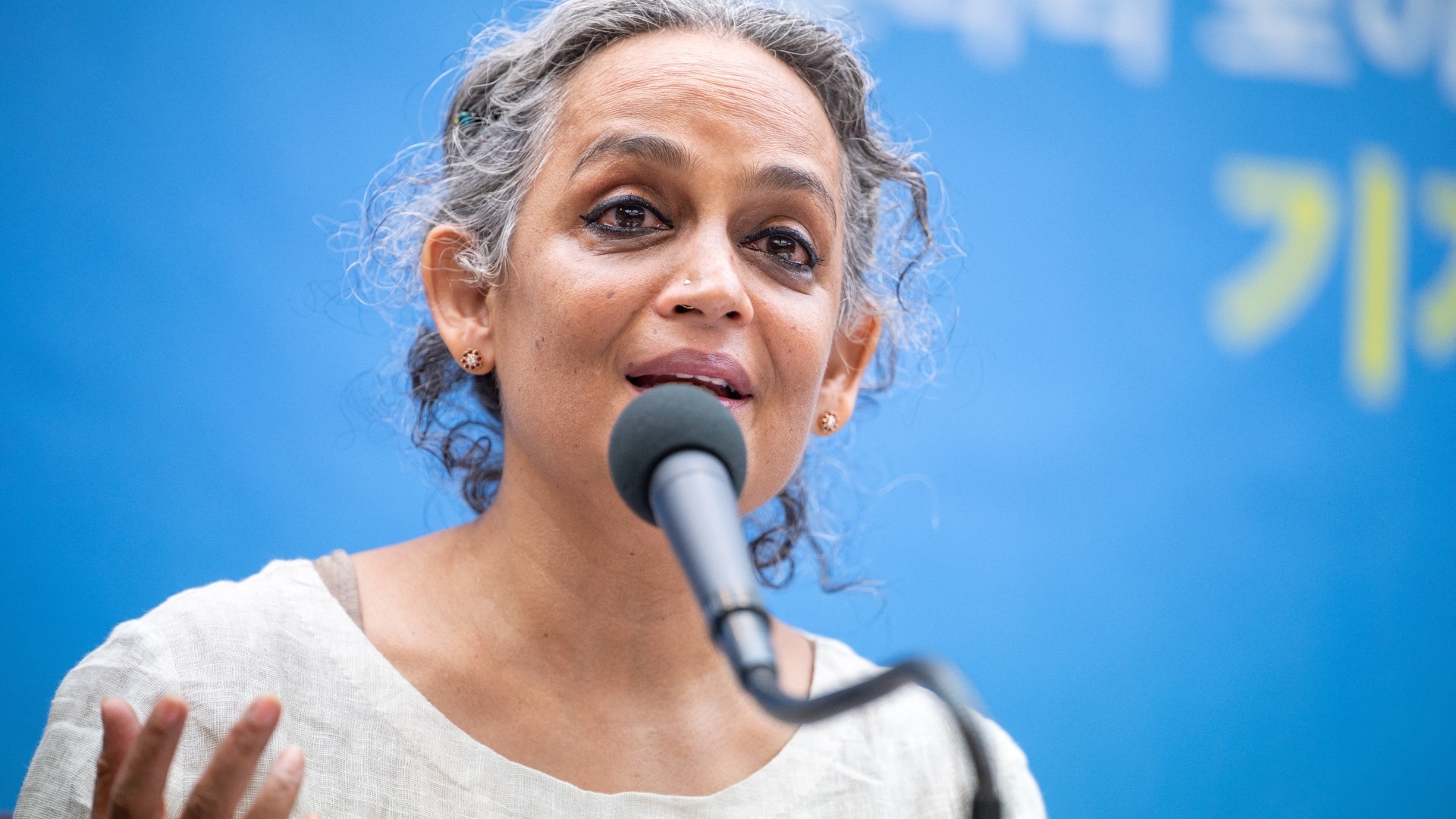
On 14 June, Indian authorities gave the go-ahead for the prosecution of acclaimed Indian novelist Arundhati Roy over her comments about Kashmir made back in 2010.
Roy, a Booker Prize-winning author and activist, was accused of sedition and disrupting social harmony under Section 45 (1) of the Unlawful Activities (Prevention) Act (UAPA), India's counter-terrorism law.
Delhi's Lieutenant Governor VK Saxena also named 70-year-old Kashmiri former professor Sheikh Showkat Hussain for his comments on Kashmir made at the same event in New Delhi.
There would have been others who may have been named, but they are either already in jail or dead.
New MEE newsletter: Jerusalem Dispatch
Sign up to get the latest insights and analysis on Israel-Palestine, alongside Turkey Unpacked and other MEE newsletters
The farcical developments in New Delhi come just days after Prime Minister Narendra Modi returned to power, albeit with a lesser margin, what some liberals in India had hoped would taper the country's descent into fascism and authoritarianism.
Yesterday, it was 'infiltrator' Muslims. Today, it is one of the world's most celebrated literary icons
Instead, the Hindu nationalist state is already back to the business of stirring up its rightwing base by reminding them of the "anti-national" demons that continue to lurk in its midst.
Yesterday, it was "infiltrator" Muslims. Today, it is one of the world's most celebrated literary icons.
And as the state is well aware, little can be done to stop it.
The assault on 62-year-old Roy has already prompted a media spectacle in the Indian and international press.
But other than repeating ad nauseum statements about the "death of democracy" and the absurdity of India's Hindu nationalist government's policing of free speech, what this attack on this extraordinary writer and thinker tells us about the Indian state and the effort it has made to hide its own history, is likely to go over everyone's heads.
Let me explain.
An event on Kashmir
It was, by all measures, an historic event.
Those who attended the event, "Azadi: The Only Way", in October 2010 at the Litte Theatre Group auditorium recall it as being packed beyond capacity.
They stood on their toes at the back, sat cross-legged in the aisles and craned their heads to listen in. The venue, designed for 327 people, easily held more than 500.
Organised by an India-based group called the Committee For the Release of Political Prisoners (CRPP), the event came as an urgent intervention following months of unrest in Kashmir against Indian rule during the summer of 2010.
The killing of 17-year-old Tufail Mattoo brought people to the streets in an uprising that was met by a vicious crackdown by the Indian state.
The boy was walking home from school when a tear gas canister fired by an Indian police officer tore a hole through his skull.
More than 120 young civilians, mostly boys, were killed on the streets by Indian troops.
In their communique about the event, the CRPP said they had organised the public discussion to inform Indians about how their government had misled them about Kashmir. In his introduction, SAR Geelani, a Kashmiri and the then-working president of the CRPP, said the committee had sought to clarify the terms of the dispute, to explain what azadi (freedom) meant and to make clear it was up to the people of Kashmir to determine their future.
Several speakers were present, including Hussain, Roy and Syed Ali Shah Geelani, leader of the Hurriyat Conference, whose mandate was a call for freedom from India.
There were other speakers, too, who reminded the audience that Kashmir was not the only anathema to the "Indian nation".
There were, after all, other areas like Manipur, Nagaland and Assam that faced immense state repression.
When Roy eventually spoke, she laid out the facts.
In her charismatic, rhapsodic style, she narrated how she had been asked repeatedly if Kashmir was integral to India, to which she answered unequivocally: "Kashmir has never been an integral part of India", adding that Delhi had admitted as much itself by taking the issue to the United Nations.
She then proceeded to underscore how India had emerged from the ashes of colonial rule to become a colonising entity of its own.
"The British drew the map of India in 1899 - so that country [India] became a colonising power the moment it became independent, and the Indian state has militarily intervened in Manipur, in Nagaland, in Mizoram, in Kashmir, in Telangana, during the Naxalbari uprising, in Punjab, in Hyderabad, in Goa, in Junagarh," Roy said.
She continued, poking at India's self-image as a "secular state".
"We know today that this word 'secularism' that the Indian state flings at us is a hollow word because you can't kill 68,000 Kashmiri Muslims and then call yourself a secular state," Roy said, referring to the death toll in Kashmir since 1990.
The event, of course, was recorded and reported widely in the Indian press.
Weeks after the event, Roy, along with Hussain, SAR Geelani and Syed Ali Shah Geelani, were reported to the police for sedition.
In response, Roy penned a remarkable riposte in the Indian daily, The Hindu.
In her article, "They can file a charge posthumously against Jawaharlal Nehru too", she listed all the times Nehru, India's first prime minister, had conceded that Kashmir was not an integral part of India during the early stages of the dispute in 1947.
At the time of partition of the subcontinent in August 1947, Kashmir was a princely state that hadn't yet decided to join either the states of India or Pakistan.
But two months later, the Maharajah temporarily acceded to India in exchange for help against Pathan fighters who had come to the region to challenge his assault on the majority Muslim population in what became a series of massacres and ethnic cleansing that cost more than 200,000 Muslim lives and displaced hundreds of thousands more.
In her remarks, Roy proceeded to underscore how India had emerged from the ashes of colonial rule to become a colonising entity of its own
Historians refer to this horror as the Jammu Massacre.
At first, India agreed to the principle of a plebiscite, but over time that changed. The Indian nationalist slogan "Kashmir is integral to India" became no different from "Algeria is France", as uttered by French President Francois Mitterand.
In her response to claims of sedition, Roy alluded to communication between then-Prime Minister Nehru and the Pakistani government.
"In his telegram... Nehru said, 'I should like to make it clear that the question of aiding Kashmir in this emergency is not designed in any way to influence the state to accede to India. Our view which we have repeatedly made public is that the question of accession in any disputed territory or state must be decided in accordance with wishes of people and we adhere to this view'", Roy wrote.
"In another telegram to the PM of Pakistan, Pandit Nehru said, 'We accepted Kashmir's accession to India at the request of the Maharaja's government and the most numerously representative popular organisation in the state which is predominantly Muslim'. Even then it was accepted on condition that as soon as law and order had been restored, the people of Kashmir would decide the question of accession. It is open to them to accede to either Dominion then," she added.
She went on to list several other communiques from Nehru that confirmed the facts of India's forced dominion over Kashmir.
It didn't matter. As someone who has consistently opposed big dam projects, objected to Delhi's nuclear tests and refused literary awards from the government, she was nonetheless condemned by the mainstream, including both the Congress and Bharatiya Janata Party (BJP) party.
But then, the media storm eventually passed. The case was neither pursued nor withdrawn; it was a card left for another day.
Along came Modi
When Modi became prime minister in 2014, his newly installed Hindu nationalist government immediately embarked on carving away at the remaining vestiges of democracy that had, at the very least, given India the illusion of being a democracy.
The judiciary was attacked, the media was captured and civil society was hounded into submission. Under Modi, India moved from a Hindu majority state (despite its touted secularism) to a Hindu Rashtra, or a Hindu state, in the mould of an ethnocracy, much like Israel.
And like Israel, India continued to evade democratic processes and institutions, like elections, civil society, the press and the judiciary. These were hollowed-out institutions operating to the dictums of Hindu majoritarianism.
In Israel's case, it is a nation for Jews. In India, it is a nation for Hindus. All those outside these categories are second-class citizens and disposable. Modi managed to push through the Citizenship Amendment Act (CAA) and make citizenship for refugees contingent on religion.
The government used the UAPA as a means to quash dissent under the pretext of "national security".
The levelling of civil society under Modi was so dire that even Amnesty International's India office was forced to shut down. The only other Amnesty country office to shut down was in Russia.
Several human rights organisations, too, have either downgraded India's democracy or issued warnings of rising authoritarianism, even raising the prospect of genocide of Muslims in India.
Even the US State Department's most recent Religious Freedom Report slammed India for its treatment of religious minorities. A year prior, the US Holocaust Memorial Museum cautioned that the risk of mass atrocities in India against religious minorities was rising.
In other words, India's "democratic descent", though still poorly reported in the mainstream western press, is no longer a well-kept secret.
As the mainstream media would attest, it is especially difficult to ignore visuals of vigilantes parading through the streets lynching Muslims for marrying a Hindu woman or on suspicion of carrying or eating beef, or more recently, when the prime minister himself publicly calls Muslims "infiltrators".
But whereas the rise of Hindu nationalism has also reached western shores and drawn naive surprise, it is unlikely that liberal discourse over the attack on Roy will focus on what she said about India rather than her right to speak.
The knee-jerk reaction to reduce India's so-called recent travails to one specifically linked to the rise of Hindu nationalism does little justice to the India that Roy has committed so much of her life to exposing.
This is more than a mere matter of a right to free speech.
The Kashmir exception
It will soon be nine months since Israel's genocidal war against the Palestinians in Gaza began.
One of the key revelations from this war in the West has been the consolidation of what is known as the "Palestine Exception" to free speech.
University professors have been placed on leave, students suspended, protesters arrested, cafe staff discharged and award-winning nurses fired, all in the name of opposing the genocide.
Some days ago, in the midst of genocide against the Palestinians, a right-wing Indian commentator called for an 'Israel-like' solution in Kashmir
In India, even prior to Modi, the exception has always been Kashmir.
Of course, under Modi, these faultlines have deepened - use of the UAPA has expanded - as the fascist state has become even more insecure, desperate to clasp on to a uniformity of thought, behaviour and loyalty to the dear leader.
Ending Kashmir's semi-autonomous status and annexing Kashmir - as he did when he ended Articles 370 and Article 35A - represented a central plank of Modi's electoral campaign in 2019.
Kashmir, as Hindu nationalists have made clear, remains foundational to the Hindu nationalist vision of an Akhand Bharat or Undivided India. Modi's actions in 2019, therefore, paved the way for Indians to become legal residents in Kashmir.
It would facilitate the Indian nationalist dream of demographic change in Kashmir. In late 2019, an Indian envoy in New York boasted as much, promising to emulate the Israeli settler model in Kashmir. Some days ago, in the midst of the genocide against the Palestinians, a rightwing Indian commentator called for an "Israel-like" solution in Kashmir.
Yet, as much as this is a case about targeting Roy (and Hussain) for their dissent, this story is incomplete without locking horns with the original myths of Indian democracy or reckoning with the ways in which India routinely demonises Kashmiris or those who dare sympathise with their cause as a way to foment social cohesion.
The question has to be asked: even if the absurd case against Roy is meant to rile up the Hindu nationalist base and manufacture a media spectacle and the state does not proceed with arrest or prosecution, how do Indian liberals and the international community expect to explain the hundreds of people already in jail, mostly held without charge, under the UAPA or Public Safety Act (PSA) in Kashmir?
For decades, there have been special laws in Kashmir, like the Armed Powers Special Powers Act (AFPSA), which allow the Indian army to shoot to kill or arrest persons on the grounds of "mere" suspicion. And that they have. Tens of thousands have been killed. Thousands of others have been disappeared. Since the 2010s, Indian troops have used pellets to maim and blind.
What will be the fate of those famous and not-so-famous civil society activists like Khurram Parvez, journalists like Irfan Mehraj, and several others? What of the Kashmiri female political prisoners in Tihar, like Asiya Andrabi, Sofi Fehmeeda and Nahida Nasreen? How about the stripping away of Kashmiri journalists and activists' passports for daring to report on the situation or the criminalisation of several civil society organisations on the ground?
In 2022, more than 36 percent of all cases involving the UAPA took place in Jammu and Kashmir alone.
Men and women are merely picked up and held for months without reason.
And if we move away from Kashmir for a moment and consider that adjacent to these are several Indian prisoners of conscience, like Umar Khalid and Sharjeel Imam, both accused of sedition under the UAPA; human rights activists Rona Wilson, Arun Ferreira, Hany Babu and Surendra Gadling, all charged with planning an insurgency against the government, during the Bhima Koregaon violence, back in 2018.
Their cases are so obviously absurd, too, that the Washington Post even found that two of the accused - Wilson and Gadling - had material planted by a hacker on their electronic devices and still nothing changed.
The drift towards fascism that Roy had forewarned, one in which "economic totalitarianism" would run riot over the lives of the poor, and prompts like "development" would cover for extraction, exploitation and colonisation, has come to pass.
It was Roy, among a spirited handful in India, after all, who alluded to the collusion between big capital and the expansion of Hindu nationalism, highlighted Delhi's closeness with Israel and the US on matters of military and geopolitical ambitions, and warned about the march towards a military state.
In this way, Roy is part of a legion of deviants whose recollection pokes at the sentiment of the nation built on a myth of anticolonialism and Gandhi and Nehruvian egalitarianism.
But in the end, India is just a big bully, built on both fragments of selective memory and collective amnesia.
If charged, Roy faces time in jail. And this could become an arduous, tiresome, even gruesome fight.
But as she would tell you herself, this seditious heart is not alone. Hers is one part of a fight for truth in a land of a thousand fictions.
The views expressed in this article belong to the author and do not necessarily reflect the editorial policy of Middle East Eye.
Middle East Eye delivers independent and unrivalled coverage and analysis of the Middle East, North Africa and beyond. To learn more about republishing this content and the associated fees, please fill out this form. More about MEE can be found here.



